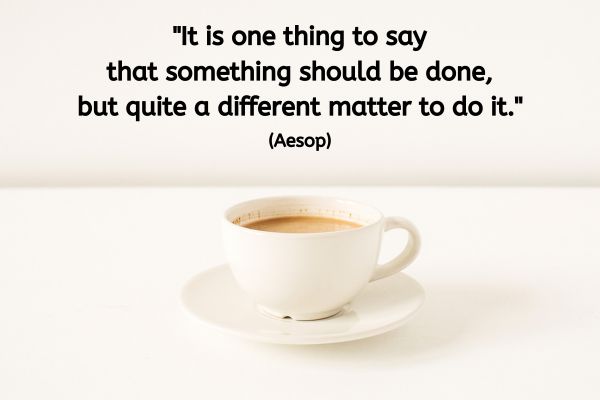To Do or Not To Do: Coaching Insights from Aesop on Getting Things Done

The quote of the day is:
“It is one thing to say that something should be done, but quite a different matter to do it.” (Aesop)
This quote from Aesop encapsulates a fundamental truth about human behaviour: the gap between intention and action. As a coach, I often observe this gap in my clients’ lives, as well as in my own. I suspect that as a coach, you’ll have your own observations around this topic.
I tend to find that my experience of doing things from my to-do list can vary significantly. There are tasks I just do because they need doing, regardless of my feelings about them. Interestingly, my experience isn’t the same each time I perform these tasks. Sometimes, I have a lot of thoughts about a task; other times, not so much. The tasks with less mental chatter tend to be more pleasant, but this isn’t necessarily a reason to do or not do something. This is a real-time example of how we are living in the experience of our thinking!
Then, there are tasks that don’t even make it to my to-do list. These are spontaneous actions that occur to me in the moment, like dropping a quick message to someone or jotting down notes that turn into a draft for a blog post. These tasks often feel more organic and less burdensome because they arise naturally from my present awareness.
On the other hand, some tasks sit on my to-do list for a long time without getting done. These tasks typically fall into two categories. First, there are tasks I think I “should” do, but that don’t actually achieve anything meaningful. When I look at them honestly, these tasks seldom create genuine progress—they often do nothing except make me look busy or fulfil some other perception I have a thought around. Second, there are tasks burdened with judgmental thoughts about how long they should take. Interestingly, I’m usually wrong about the time required, and often, I end up doing them naturally when the timing feels right, with minimal thinking involved.
Understanding the “Shoulds” and “Shouldn’ts”
One insight I’ve gained is that the tasks burdened with “shoulds” are often tied to external expectations rather than internal motivation. These are tasks we feel obligated to do to meet others’ expectations or societal norms. The challenge is that these tasks can create a sense of resistance and procrastination because they aren’t aligned with our intrinsic goals or values.
Understand that I’m not saying you should now add another rule about shoulds and shouldn’ts. I’m suggesting that when you notice that’s what you are doing to yourself, it can be worth reassessing with a fresh perspective whether it’s something you want to keep on your to-do list. It may be that there are real-world consequences for either completing or not completing a task, and sometimes when we look, there actually aren’t!
The Role of Noticing
It seems to me that as humans, our system is set up so that when we are getting caught up in thinking, adding pressure to ourselves, etc., we feel that. Depending upon how aware we are of that, it can take a lot for us to notice those increasingly less subtle signals.
What if, when we notice that, it can be just a signal for us to “step away from that thinking”? Acting as a gentle nudge that we don’t need to figure out what a particular thought was that is turning up the heat, just that we could mentally do with a bit of fresh air and take a moment to let that settle down.
Embracing Natural Flow
Another key insight is embracing the natural flow of action. When we act spontaneously on tasks that occur to us in the moment, we often experience a sense of ease and accomplishment. This natural flow is disrupted when we overthink or judge our actions too harshly. Trusting our intuition and allowing ourselves to act on impulses can lead to more productive and satisfying outcomes.
Practical Tips for Bridging the Gap Personally
- Simplify Your To-Do List: Focus on meaningful tasks that contribute to your goals. Remove or delegate tasks that only create the illusion of productivity.
- Trust Your Intuition: Allow yourself to act on spontaneous impulses when appropriate. Trust that your natural inclinations can lead to productive and fulfilling actions.
- Challenge Time Judgments: Notice when you’re imposing unrealistic time expectations on tasks. Give yourself permission to complete tasks in the time they naturally require.
What does this quote prompt for you? What do you see as a coach and as an individual around this topic?
About Jen Waller

Jen Waller is a transformative coach dedicated to empowering individuals to get out of their own way and make a meaningful impact in the world. With an impactful, nurturing coaching style, Jen supports clients in unlocking their potential and achieving their goals. As an experienced coach and trainer, she guides clients from self-doubt to success.
Discover how Jen can help you transform your journey here.